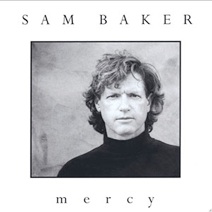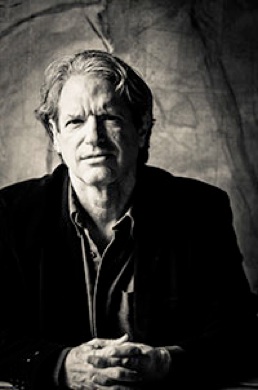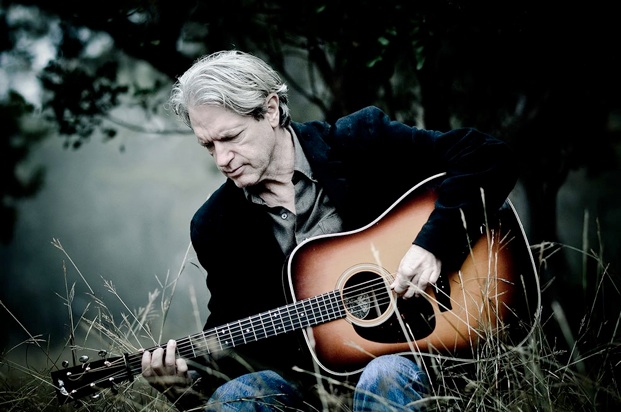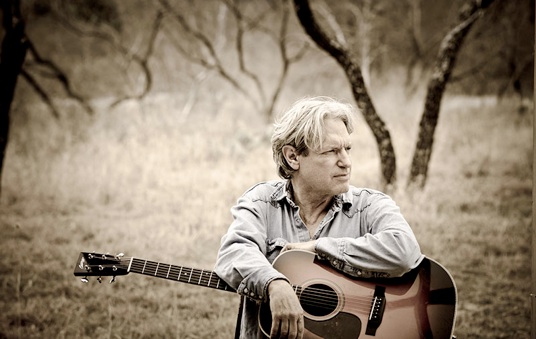Sam Baker
Everyone is at the Mercy of Another One’s Dream
By Richard Cuccaro









Sam half sings, half speaks in a gently sand-blasted drawl, and it took until 2006 for people to start taking notice. Texas Music Magazine rated Mercy #1 on its best 60 albums of the year. Geoffrey Himes, a reviewer for the magazine, called Sam “a cross between early John Prine and prime Townes Van Zandt.” Himes also spoke of musician/producer Gurf Morlix’s reaction to Mercy: “He stood on the back stairs at Antone’s between sets and told me that he had just discovered the best songwriter he’d heard in years — a songwriter as good as his former and current clients, Lucinda Williams, Mary Gauthier and Ray Wylie Hubbard…” Morlix had no connection to the record. He just loved it.
The brilliance in Sam Baker’s debut recording was a long time in the making. It wasn’t built on, say, a decade of touring and woodshedding (though he has done that). It had instead risen from the ashes of a life nearly stolen.
In 1986, a friend asked Sam, then 32, if he wanted to join him on a trip to the mountains of Peru. Sam, an outdoor-loving, whitewater river guide, said “Sure.” After hiking ice-capped peaks for six days, they wanted to see Machu Picchu, so they went to Cuzco and got on the tourist train to get there. Sitting in a small compartment, two abreast, a German couple opposite him and their teenaged son next to him, Sam took no notice of the red rucksack on the shelf above the head of the boy’s mother seated diagonally across from him. He talked with the multilingual teenager briefly. Suddenly, a bomb planted in the rucksack by Shining Path guerrillas went off with the train still in the station, sending shrapnel outward, killing the German family and four others immediately. Sam was still alive, but the explosion severed the main artery and vein in his left thigh and he almost bled to death. He suffered brain damage, kidney failure and severe hearing loss. An operation in a local hospital saved his life, but he developed gangrene and was dying from the damage to his brain and kidneys. His hands were mangled, the left one nonfunctional.
After five days, a U.S. military jet airlifted the American survivors back to the U.S. A pilot rest stop was scheduled on the way, but a young girl’s mortal injuries caused the flight to proceed directly to San Antonio so her family could see her and she could have her last rites. If they had made that rest stop, Sam would have died — he was going that fast. The Shining Path had killed eight people. They had also, unwittingly, given birth to a poet. It would take 17 reconstructive surgeries and a long time for the gestation to finish and fully emerge, but it did, from a life totally redirected.
Beginnings
Part of Sam’s ability to focus on the drama within the lives of ordinary people is his small-town upbringing. Prohibition left his hometown of Itasca, Texas, dry. “You couldn’t buy any booze,” he said, “but there were tons of churches, so people centered their lives around them. In the church I went to, there was a lot of music — traditional music. I was hearing melodies from the time I was a child. My mother played both piano and organ part time for the church. She had a piano at home. My mother and father both had lots of records.” His father listened to “a lot of interesting stuff”: Sonny Terry, Brownie McGhee, Lightnin’ Hopkins, Doc Watson and early Johnny Cash. His mother listened to Handel, Chopin and church music. “So,” he said, “I was kind of swamped with music, to be honest. I took piano lessons when I was real young, but it got in the way of baseball. Later on I got a guitar from a pawn shop and learned how to play a little.”
After graduating from University of North Texas with a B.S. in Business Administration, Sam worked as a bank examiner in Midland, Odessa and El Paso. He quit the desk job and became a whitewater river guide based in Terlingua, Texas. In the off-season, he worked as a carpenter.
During that time, Sam played guitar (right-handed, then) in bars for fun and to meet people, particularly pretty girls. Playing covers with friends, he stood on stage, humming along while he strummed chords. He also wrote a few love songs, but, as with many a budding songwriter, these were mundane, “I love you, you love me, you don’t love me” affairs. “I didn’t have anything to say,” he has admitted to many an interviewer. There was time to travel in those days, so when his friend suggested that fateful trip, Sam eagerly agreed.
The Aftermath
As stated, there were many surgeries to reconstruct the damage to Sam’s body. In the wake of the explosion, he couldn’t walk, and the back of his left hand had a channel-like hollow blown out of it. The hand bent in the middle instead of at the wrist. Doctors weren’t sure he was going to survive, so the hand went untreated for a month. When his survival was assured, they finally did tendon implants and Sam began rehabilitation.
Still in a panic mode, he felt driven, in a nebulous way, needing to recover what he had lost. Could he be his old self again? Could he walk? Could his hands work again? Could he hear what other people were hearing? He suffers from permanent tinnitus. His left hand was still a mess and there was a cut tendon and a knuckle blown off the right. He wanted to learn how to get his fingers to do anything. One of the skills he sought to regain was playing guitar. It would be left-handed picking this time, since those fingers would never again finger frets. His left thumb still worked, so he could hold a pick when the hand functioned again. By the late ’80s he had gotten a guitar, strung it upside down and learned to fret with his right hand.
The mental scarring would take even longer to heal. “I found I could remember things in the past but I just couldn’t recall certain words … I’d see a chair but the name wouldn’t come. I’d end up having to say, ‘I need that thing for sitting on.’”
He suffered phobias, always seeking to keep objects between himself and large store windows, fearing shards of glass that might be hurled by an explosion. He moved numerous times. “I was under a fight-or-flight reflex. I felt every room I walked in, every car I rode in, every plane I flew in, was going to blow up. I thought every moment could, faster than I could blink my eyes, change to me dying.”
Looking back, he realizes that he was suffering from a form of post-traumatic stress disorder. “I should have gotten professional help, but I tried to get through it by myself.”
Finding a Voice

Our discussion of songwriting unveiled his superior intelligence. It’s said that God is in the details. He told one interviewer: “The big things in my life have encouraged me to look at the small things. The big things, I can’t seem to get a handle on, but the little things I can. There is a lot of detail about the characters in my songs. It’s easier for me to see that now. It’s easier to talk about detail. Maybe it’s safer. The details become us. We are the details of our lives. It’s the things within our reach. That’s our life.” Sam feels rewriting is “God.” Deleting passages that don’t work can be hard. Writers call it “killing your children,” I mentioned. Sam added, “Not only that, it’s killing your favorite children.” Knowing what to take out is important. “If you take out too much, you have nothing,” he said. “There are things that have to be accepted. The power of “no” when I leave stuff out makes the power of “yes” much more compelling. The editing part of the short fiction helped the songwriting.”
Playing and Recording
In 1998, his sister, musician Chris Baker-Davies, made a record, Southern Wind, and included some of Sam’s early songs. Hearing his songs played by others made him want to push further, to really learn the craft of songwriting. “I knew the instinct of writing but I didn’t know the craft.”
In 2000, still deaf in one ear and partially deaf in the other. he made the improbable decision to become a performer. No one, besides his sister, was going to perform his songs. In 2002, he started doing open mics. “It was awful. I had terrible stage fright. My hands were still pretty beat up. I could barely play.”
The next step was something akin to being a busker. “I started playing in a road house out on Route 87, a couple of hours west of Austin. It was real loud — there were trucks going by, people were eating and they were dropping plates and stuff. It was what I needed. I needed to play for people who couldn’t hear what I was doing. I could be invisible for a year, year-and-a-half. I finally looked up and I wasn’t so terrified. People started to get what I was doing and we were all singing along together. It was really a lovely thing.”
In 2003 Baker opened a show for Texas singer/songwriter Walt Wilkins, at a bed and breakfast establishment in Llano, Texas. Wilkins told Sam he knew how he should sound and arranged for Sam to visit Nashville, his recording base. Wilkins and co-producer Tim Lorsch recorded Sam’s voice, guitar and harmonica on a dozen originals, then layered background instruments and vocals to create Sam’s brilliant 2004 debut, Mercy.
Around 2006, Sam opened for Gurf Morlix after Gurf had heard Mercy. Morlix then appointed himself Sam’s unpaid mentor and publicist. At every opportunity, Morlix would drop Sam’s name to fans, fellow musicians and DJs. The biggest push came from Morlix’s leverage with influential British disc jockey Bob Harris, who played it on his national radio show. The reaction was almost immediate. Sam tells how he woke up one morning and found that his CDs had sold out. He made a second album, Pretty World, in 2007. When Sam toured Britain in support of Pretty World, he did a live slot on Harris’ radio show, and told Harris how grateful he was for sending his career to a brand new level. He said: “I don’t know that you know how instrumental you are in my being here, not just in London, but wherever I am as a writer or a player. I don’t think you know how invisible I was. I wasn’t playing much and I could track all my sales. I was selling one record every 90 days. And then, one day, my three tiny web sites were empty. It was because of you and the people in the U.K. They had emptied everything. I was shocked.” Harris acknowledged how eager he was to hear someone Morlix had rhapsodized over, and subsequently, how much he loved Sam’s work.
Sam has written songs that piece together the horrific experience in Peru. Among them are “Steel” and “Angels,” both found on Mercy. However, the most affecting of these, from Pretty World, may be “Broken Fingers,” which he performed live on Harris’s show, a song in memory of that German boy: Forget his face? / Of course I don’t / Etched like a crystal vase / These broken fingers / Some things don’t heal / I can’t wake up from a dream / When the dream is real … It’s impossible for me to hear it or even read the lyrics and not be moved.
Cotton, his third album was released in 2009. I saw him perform the song “Mennonite” from that album in 2013 at a house concert at Kathryn_space in Manhattan’s East Village. It’s about a young man who shakes off his religious roots, finds a young woman and makes a go of it, in spite of her wildness: He bought a pearl snap shirt / Stitched with horses and stars / A handsome pair of boots / Started driving past bars / Where women wore short skirts / Made out in cars / Drank beer by the quart out of mason jars … Got married had kids / Never was hard / Who’s to say what love is? / Is it hearts and stars? / Boots and beer, the back seat of cars? / On the floor board / There’s a short, short skirt / Wrapped in the arms of a pearl snap shirt. Sam asked the audience if this sort of female had ever appealed to anyone. My hand shot up. He laughed and said, “That hand just went up all by itself, didn’t it?” Sam’s warmth and humor made it a special night.
Last year’s release, Say Grace, continued the exploration of hardscrabble lives. In “Ditch,” we’re treated to a peek inside the mind of a man who lays pipe and is grateful for the work. His musings about his delusional wife provide some levity: My wife, God bless her and for what it’s worth / thinks she and Taylor Swift / were twins at birth / separated at birth / Earth to wife / wife to earth.

As one reviewer put it so aptly: “There’s a conspiracy between Sam Baker and his studio production team to break your heart. He’s coming for that engine in your chest and he means to yank it out and stomp on it. His cracked, raspy vocal rides the scalpel-sharp quicksilver combination of pedal steel and fiddle. No hesitation. No faking. Uncompromising tales of small-town lives roll out like something out of a Faulkner novel.”
If those of us living in the New York metropolitan area are lucky, more venue operators here will put this brilliant songwriter to work and we’ll see a lot more of him.
Upcoming Performances include:
Apr 2 7pm Iron Horse, Northampton, Mass.
3 7pm Club Passim, Cambridge, Mass., w/ Amy Speace and Carrie Elkin
4 7pm Otto Pizza, Portland, Maine
5 7pm Common Ground, South Presbyterian Church, Dobbs Ferry, N.Y.
w/ Carrie Elkin
7 6pm House Concert, Denville, N.J.
8 7pm Rockwood Music Hall, New York, N.Y, John Platt’s On Your Radar
w/ Hannah & Maggie, and Krista Detor.
9 6pm House Concert, Media, Pa.
10 8pm Gypsy Sally’s, Washington, D.C. w/ Carrie Elkin and Del Barber
Website: sambakermusic.com
--------------------------------------------------------------------------------------------------------------
Sam Baker’s awareness and appreciation of the beauty and detail in life’s moments extend to his photography skills. He has a superior eye for special points in time and subject matter. Larger, more viewable versions of these photographs (and many more, plus his paintings) can be found on the blog page of his website.
road and sky deck chairs the hudson the end of summer taxi in the rain august 2013



















